India punters can now try their luck at a fully online, state-authorised lottery. The ilottery is meant to add transparency to an industry often tainted by claims of mismanagement or fraud.
Ticket sales began yesterday, with the first draw set for 24 November.
Goa’s Directorate of Small Savings and Lotteries sanctioned the app-based platform, licensing Rhiti Group as the operator. Group founder Arun Pandey told MediaBrief that Great Goa Games will give players “a secure and convenient way” to play. Rules governing online lottery were published by the directorate in February 2023.
“Our mission,” he said, “is to democratise opportunities through technology.”
Presently, 13 states including Goa – known as “the Las Vegas of India” – permit lottery games. Others have banned them over concerns about gambling addiction, mismanagement or corruption.
India lottery in disarray
Goa government chief Narayan Gad said the regulated games will “set a new standard in the lottery industry. The technology-based product will enhance transparency and ensure improved monitoring and regulation of operations.”
However, online platforms are hardly immune to claims of fraud and manipulation.
According to technology website MediaNama, Kerala once offered an online lottery, limiting it to one draw per week. Government officials pulled the plug after finding that multiple lotteries were operating simultaneously. The subsequent ban made Kerala an “online, internet and computerised lotteries-free zone”.
Similarly, law enforcement in Maharashtra found evidence that government officials and online lottery operators were conspiring to run multiple lotteries in a single day.
In a 2015 Supreme Court ruling that upheld the Kerala ban, justices noted that ticket terminals were subject to alteration. As a result, players had no guarantee their tickets were issued from a legitimate server.
Getting with the times
According to a 2024 white paper from not-for-profit think tank Pahle India Foundation (PIF), India’s lottery industry has simply failed to keep up with the times with its reliance on paper tickets and physical retailers.
“Paper-based lotteries are prone to issues such as loss of tickets during transportation, sale of defective or fake tickets and the difficult and arduous task of maintaining records of tickets (sold, unsold and defective),” the paper stated. “Handling high volume transactions… poses a serious logistical challenge compromising integrity and compliance, potentially leading to corruption.”
Moreover, the World Economic Forum has described India as “the next Silicon Valley”. The country’s high-tech culture doesn’t jibe with low-tech gaming applications, said PIF.
A focus on paper-based lotteries “implies that India’s lottery industry does not adequately leverage the growing access to smartphones and cheap internet”. The sector “has yet to be aligned with [the] vision of Digital India to make it more transparent, efficient, compliance-oriented and with enhanced player protection”.
Broader benefits, potential for revenue
PIF estimated Indian lottery revenue at $33 billion (£26 billion/€31 billion) annually with potential taxes of $12 billion.
The Hans India notes that Great Goa Games will emphasise responsible gaming through educational resources that help participants play it safe. “Additionally, the online lottery will ensure transparency in operations, allowing users to track how lottery proceeds are utilised, particularly to funding social initiatives like education and healthcare.”



